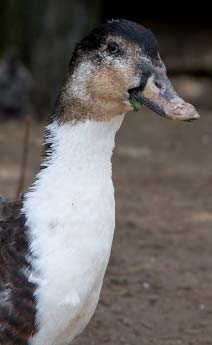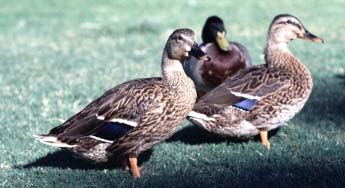
Another eBookWholesaler Publication
Proudly brought to you by
John Reese
Email
Recommended Resources
• Web Site Hosting Service
• Internet Marketing
• Affiliate Program
“Your Duck Keeping Guide” by Ken Smythe
Page 2 of 40
Please Read This First
Terms of Use
No alteration by anyone to the appearance, format or content of this
ebook as supplied by eBookwholesaler is allowed. This Electronic book
is Copyright © 2012 eBookwholesaler. All rights are reserved. No part of this book may be reproduced, stored in a retrieval system, or transmitted by any
means; electronic, mechanical, photocopying, recording, or otherwise,
without written permission from the copyright holder(s).
You must not distribute any part of this ebook in any way. eBookwholesaler
Members are the sole distributors and must abide by the eBookwholesaler
page for Terms of Use. No-one may offer or distribute this book through eBay or any type of auction. This book is published by eBookwholesaler and
no-one else may claim to be the publisher.
Disclaimer
The advice contained in this material might be suitable for everyone. The
author got information from sources believed to be reliable and from personal experience, but does not imply nor offer any guarantee of accuracy.
The author, publisher and distributors never give legal, accounting, medical
or any other type of professional advice. The reader must always seek those
services from competent professionals that can review their own particular
circumstances.
The author, publisher and distributors particularly disclaim any liability, loss, or risk taken by individuals who act on the information here. All readers must accept full responsibility for their use of this material.
All pictures used in this book are for illustration only. No link or endorsement between the people pictured and the book, author or publisher is implied and
should not be assumed. All pictures must not be used for anything else
without the rights holder’s prior written permission.
Images © 2012 Jupiterimages Corporation, a Getty Images company.
©
Copyright 2012 eBookwholesaler All rights reserved
- 2 -
“Your Duck Keeping Guide” by Ken Smythe
Page 3 of 40
Contents
Please Read This First........................................................................................2
Terms of Use ...........................................................................................................................2
Disclaimer................................................................................................................................2
Contents ..............................................................................................................3
About the Author ................................................................................................5
Introduction .........................................................................................................6
Can Your Ducks Save You Money? ......................................................................................6
What Age should Your First Ducks Be? ...........................................................7
Where to Get Your Ducks...................................................................................8
A Couple of Ducks ............................................................................................11
Ducks are not Good House-Pets .....................................................................12
Choosing Your Vet............................................................................................13
Housing Your Ducks.........................................................................................14
The Duck House........................................................................................................................15
Where to get Help .............................................................................................17
Keep Safe and Legal.........................................................................................18
Protecting Your Ducks .....................................................................................19
Birds.......................................................................................................................................20
Wild Animals .........................................................................................................................20
Controlling Predators...........................................................................................................21
Water..................................................................................................................23
Choosing Your Ducks ......................................................................................24
Which Breeds are Best?...................................................................................25
Meat............................................................................................................................................25
Muscovy ................................................................................................................................25
Peking ....................................................................................................................................25
©
Copyright 2012 eBookwholesaler All rights reserved
- 3 -
“Your Duck Keeping Guide” by Ken Smythe
Page 4 of 40
Eggs ...........................................................................................................................................26
Orpington ..............................................................................................................................26
Campbell................................................................................................................................26
Pets ............................................................................................................................................27
Call Ducks .............................................................................................................................27
Basic Health Checks.........................................................................................28
What to Look For ..................................................................................................................29
Don’t Delay ............................................................................................................................30
Handling Your Ducks........................................................................................31
Take Care for Yourself and the Duck..................................................................................31
Travelling with Ducks .......................................................................................33
Take Care in Vehicles...........................................................................................................33
Processing Your Ducks....................................................................................34
Resources .........................................................................................................37
Organizations for Duck Owners..............................................................................................37
United Kingdom ....................................................................................................................37
U.S.A. .....................................................................................................................................37
Information ................................................................................................................................38
Killing Ducks for Food .........................................................................................................38
Farewell from Ken Smythe ...............................................................................39
©
Copyright 2012 eBookwholesaler All rights reserved
- 4 -
“Your Duck Keeping Guide” by Ken Smythe
Page 5 of 40
About the Author
Ken Smythe was introduced to ducks at an early age, when he stayed at a
farm belonging to a relative.
Ken said, “They had a variety of animals as well as chickens and ducks.”
“I enjoyed being around all of them. But, the ducks were a firm favorite for
me right from the first time I saw them up close.”
Ken wrote his book for people that want to keep ducks to provide food for
their table or as pets.
Ducks have other benefits apart from their eggs and meat.
They are fun to watch and can also be a great help keeping down the bugs
and some other pests in gardens and orchards.
Ken said that many people think that ducks are more difficult to look after
than chickens and need a great deal more room.
“I believe that my book will help my readers become successful duck
owners.”
“They will learn that ducks have different requirements to chickens, for
example, but they are not as hard to keep as many believe.”
“This ebook will help you to save time, money and avoid stress by giving you
the information you need and the best tips for successful duck keeping.”
“It has all the information that you need to keep your ducks happy and
productive!”
©
Copyright 2012 eBookwholesaler All rights reserved
- 5 -

“Your Duck Keeping Guide” by Ken Smythe
Page 6 of 40
Introduction
Ducks are fascinating to watch, but they are also of great value to their
owners as a source of eggs and meat.
They can assist keeping your garden almost slug and snail free. You must
carefully protect plants like lettuces which they are partial to nibbling on
whenever they get the chance. But, the benefits of their presence probably
far outweigh the small amount of your garden which they take in return.
Can Your Ducks Save You Money?
Many people are surprised and disappointed when they check into the costs
of raising ducks to provide meat and/or eggs for their table.
Unless it's done on a professional basis with a flock,
your eggs and duck burgers will cost more than if you
just buy some from the local store.
But, there are benefits which most people might
consider more valuable which out-weigh the extra
costs involved.
There are many people who are starting to keep
ducks because they want to have more control over
what they feed their family.
Many people have reservations about how some meat
products and eggs are produced commercially. Feeding your family from your
own livestock is appealing. You know what the birds eat, that they are kept
in clean conditions and treated humanely through all stages of their lives.
The good news is that it is not as hard or costly as you might imagine. I
believe that my book will guide you through all the steps you need to become
a successful duck owner. We’ll start with the information you need to know
before you actually get any ducks and take you through to where you should
be eating your first eggs. I envy you the enjoyment and satisfaction you
have ahead of you! Ken Smythe
©
Copyright 2012 eBookwholesaler All rights reserved
- 6 -

“Your Duck Keeping Guide” by Ken Smythe
Page 7 of 40
What Age should Your First Ducks Be?
This question is important. The best answer will vary according to the
purpose which you are buying your ducks for and your own experience and
environment.
Buying young ducklings will save you money initially. But,
you will have to pay more for their special feed and also
invest more time in the first couple of months than if you
bought older birds.
Advanced birds will have been cared for through the most risky time of their
lives, when they are developing and subject to many perils simply because of
their inexperience.
I suggest that you get birds which are about twenty weeks old or more for
your first stock. They will be young enough to adapt to the routine which you devise for them, but will probably require less intense supervision than very young ducklings would.
When you have had the experience of caring for your first ducks, you will be
more confident and capable to decide for yourself the type of stock you buy
and raise in the future.
©
Copyright 2012 eBookwholesaler All rights reserved
- 7 -
“Your Duck Keeping Guide” by Ken Smythe
Page 8 of 40
Where to Get Your Ducks
There are a number of ways to get your new ducks.
Don’t be in a hurry to get your ducks – that can cause you to make serious
mistakes.
Reading this section of the ebook will give you a good idea of the sort of
stock which will be most suitable for you and the area you have available.
You also will know what questions to ask and be able to judge from the
answers and the attitude of the seller whether you should proceed with
buying from them.
Some people are better at selling ducks than they are at producing good
quality birds.
A good tip whenever you want to buy something, especially in a one to one
situation, is to keep your knowledge to yourself. Just ask questions that will help you increase your knowledge and decide if what’s offered is really
suitable for your requirements.
But, don’t volunteer information which may be more help to the seller than to you. Telling the seller that the breed they are offering is just what you having been looking for will mean you pay more than you probably need to.
Casual advertisements can be a source of good bargains but you should be wary. If you don’t know the seller and can get no information about them
from other duck owners, you have to check everything you see and are told
before you agree to buy.
The reason offered for selling their birds may be true but you should inspect everything and follow your instincts if anything does not seem right.
You should view any casual sales as final because it would be hard, if not
impossible, to get your money back. The time and cost involved might be
worth more than the amount involved.
Also, you should always get only stock which you are very satisfied with. If
there seems to be any question about their health, actual breed or other
qualities, politely decline the offer and walk away.
©
Copyright 2012 eBookwholesaler All rights reserved
- 8 -
“Your Duck Keeping Guide” by Ken Smythe
Page 9 of 40
Breeders are a wise choice when you are starting your venture with ducks.
Most experienced duck owners prefer to always get their stock from them,
even when there are other, probably cheaper options available.
If you are likely to be buying more stock on a regular basis, you may develop a business relationship with a particular breeder. But, when you are deciding where to buy your first few ducks, don’t settle on the first lot you see. Check what is available from as many breeders of suitable birds in your area. You
want to find the best ducks and one or, preferably two, reliable sources of
future birds.
The breeders are, of course, a great source of reliable information about
ducks. Good breeders don’t mind a couple of questions but always respect
their time.
Always contact them as soon as you have made a firm decision to get some
ducks because they will be able to tell you whether they have the type you
want and, if so, when the next lot will be ready for sale.
I suggest that you never buy anything but good quality stock. But, if you are buying ducks for food rather than to breed or exhibit, you may sometimes be
able to get healthy birds that are not completely true to the breed standards from breeders.
The Internet is a great source of information about every aspect of keeping ducks, though there is also a lot of misinformation available there as well.
More ducks and other livestock are now being sold that way too. This should
be okay if you are able to verify the reputation and standards of a particular seller.
But, you have more risk when you are dealing with sellers who are not
located near you.
It’s much better, especially when you are just starting out, to buy only birds which you can see and even smell.
©
Copyright 2012 eBookwholesaler All rights reserved
- 9 -
“Your Duck Keeping Guide” by Ken Smythe
Page 10 of 40
If you order from a distant source and there is a problem with the birds you
get, or if you don’t get them, you will have to invest more time and money in getting the matter sorted.
Also, you may need to get special permits or follow specific procedures if you are getting birds from outside your own State. Regulations are much stricter
since the outbreaks of Avian flu became more common and widespread.
Farm sales and markets are often the source of someone’s first ducks or other stock. You can sometimes get a bargain if you have a solid knowled e
g
of the type of bird you want to buy.
But, there can be traps if your enthusiasm is greater than your knowledge.
Some sellers will misrepresent the age, productivity, quality or even the
breed of the birds they offer. This may be deliberately deceptive or they may have been misinformed themselves when they bought the birds.
There is also probably a greater risk of getting stock which has health
problems in the form of disease or parasites from one-off markets and sales.
Never make any exceptions to this rule: Whatever the source you get
your new birds from, keep them isolated and watch them carefully for two
weeks before putting them with any other birds you already have.
That will help to protect your established flock.
©
Copyright 2012 eBookwholesaler All rights reserved
- 10 -

“Your Duck Keeping Guide” by Ken Smythe
Page 11 of 40
A Couple of Ducks
If you want to just have a small number of ducks, two is much better than
one.
Ducks are very social birds and they
also have a need to establish who is
the “boss” duck. So, a single duck is
unlikely be as comfortable without at
least one other duck with it.
Don’t get a male duck unless you
intend to breed ducks. Then you should have at least six ducks and one
drake. Less will cause the ducks to be harassed a lot by the drake during the season.
A small group of females will be fine without the attentions of a drake. They will also be easier to look after and, yes, they will probably lay just as many eggs.
The eggs will be infertile but that will not affect their nutrition value or taste to any noticeable degree.
If you have more birds and get a male that has not been de-sexed, you will
need to put more effort into maintaining the health and welfare of your birds.
One drake (male duck) can happily tend to the needs of up to ten females.
Having a higher ratio of drakes will probably cause the females stress
because of the competing and frequent attentions of the drakes.
©
Copyright 2012 eBookwholesaler All rights reserved
- 11 -
“Your Duck Keeping Guide” by







